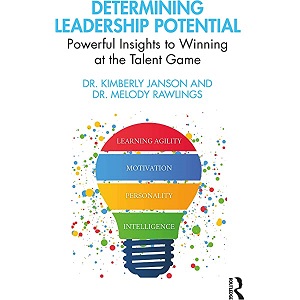
Kimberly Jansen and Melody Rawlings know their stuff. There’s never the sense they stumble or any of the ideas they present aren’t fully statistically-backed, evidentially sound, and concepts they’re fully capable of unpacking to the fullest degree. “Even though it is not an actual form of intellectual intelligence, people associate emotional intelligence with intellectual capability, so we included it on the list of offerings for both personality and intelligence (with leadership),” they write in their new book, Determining Leadership Potential: Powerful Insights to Winning at the Talent Game. “It was initially associated with intellectual capacity, but further research has suggested it demonstrates interpersonal and personal effectiveness, including people’s ability to manage interpersonal difficulties. It was included here because of some participants’ association with intelligence and our desire to test how people think about it. It was also included in the section we queried on personality, where it belongs. Several CEOs explained they were looking for a combination of these attributes identified above as it relates to intelligence.
What is meant by this is they do not look for intelligence but how it manifests such as problem-solving, decision-making, etc.” The writing reflects the authors’ confidence. They don’t adopt any sort of sanctimonious, or high-handed tonality – instead relaying the information in bell-clear, concise prose. A lot of business and leadership advice authors can feel unfavorably like showmen, people with a deliberately flinty and celestial house style that makes the whole affair feel egocentric and almost like a sort of self-promoting, literary-based commercial. Jansen and Rawlings, however, possess no such traits. Not only is it commendable with respect to their being trustworthy ideological guides, but it also speaks to the strength of what they’re promoting in the pages.
AMAZON: https://www.amazon.com/Determining-Leadership-Potential-Kimberly-Janson/dp/1032220333
“As practitioners, academic researchers, and deep subject matter experts, we know personality to be a major influence in whether someone will be effective in a leadership role. Countless research supports this assertion, but also our research and 40+years of practical experience in working with leaders support this assertion. It is less about specific personality types and more about avoiding derailing personality traits that derail someone’s effectiveness,” they write in a particular passage reflecting this. “…The good news about emotional intelligence is that it can be developed. Developing EI would require grinding to be able to develop competence in that area. It takes hard work to become more self-aware, it takes hard work to maintain self-control (especially for us redheads).
To immerse yourself in someone else’s experience is hard work, and to have a consistent set of behaviors that create a trusting relationship is not a walk in the park. However, if these are indeed deficiencies, they can be so significant that they can implode people’s career aspirations. Related to the discussion of emotional intelligence is chemistry because of the association with the idea of connecting with folks. Thirteen CEOs specifically identified chemistry as a critical factor when discussing personality. Chemistry is about personality and whether the combinations of personalities will work well together. CEOs talked about fit, collegial behavior, being able to connect and work together, being respectful, culture fit, needing to mesh, attitude, how well they work together, having shared/aligned values, and wanting someone that the team will like and trust.”
Cyrus Rhodes



























